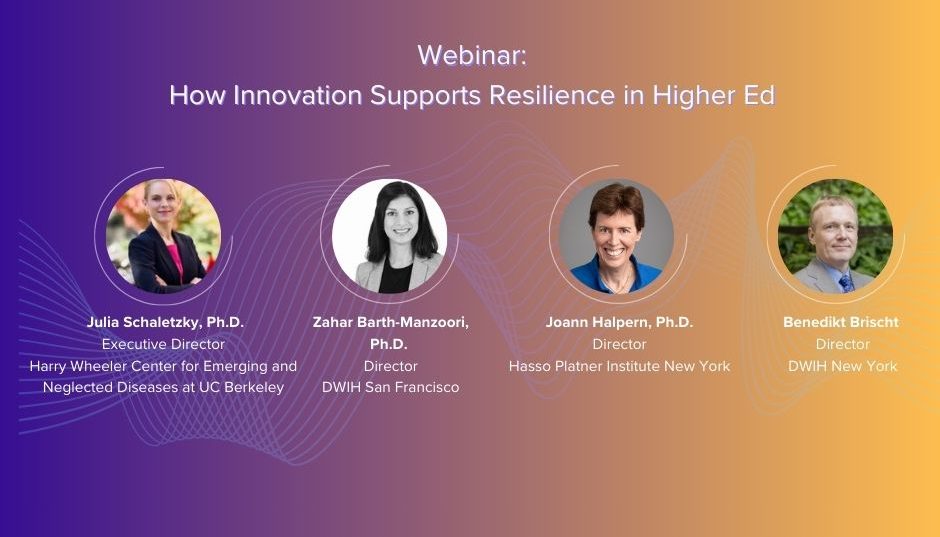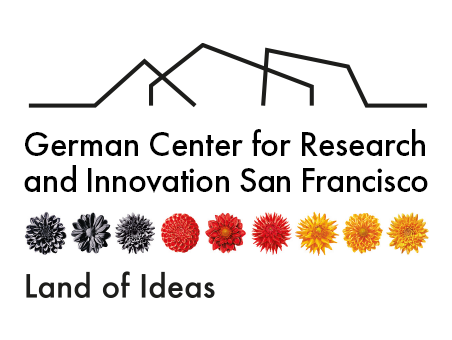How Innovation Supports Resilience in Higher Education

Among the key topics discussed at a webinar on November 8th on resilience in higher education were the U.S. and German systems, both regions’ approaches to handling crises, as well as design thinking. Moderated by Zahar Barth-Manzoori, Director of DWIH San Francisco and Benedikt Brisch, Director of DWIH New York, the event brought in Julia Schaletzky, Executive Director of the Harry Wheeler Center for Emerging & Neglected Diseases (CEND) at UC Berkeley and Joann Halpern, Director of the Hasso Plattner Institute in New York. The speakers shared their thoughts and responded to questions from the online audience of around 100 people.
In his introductory remarks, Brisch addressed the importance of resilience. In crises such as the COVID-19 pandemic, individual and societal resilience was challenges, as people suffered from mental health challenges and the national health system needed to constantly adapt. In response to these building resilience, Barth-Manzoori pointed towards the Bay Area as an innovation hub that embraces innovators from different backgrounds and is characterized by a specific mindset which fosters innovation in institutions, norms and values.
The first speaker, Julia Schaletzky, spoke of the uniqueness of the Bay Area as an entrepreneurial atmosphere and a feature as a key hub for biotech. Reflecting on her educational and research background in the life sciences, she also compared the Bay Area with Germany, where she studied in Bayreuth. The German university system not only has a reputation of scientific excellence and offers a rigorous scientific education, but also does not charge tuition at its public universities. In contrast, Schaletzky believes the customer-oriented mindset of students in the United States can negatively impact the education they receive, as students might expect to pass if they pay for classes and professors rely on student feedback for tenure. Furthermore, Schaletzky responded to a question on the industry-academia relation in the Bay Area, noting that there is a learning concept involving mutual/reciprocal exchange and collaboration between industry and higher education institutions in a bi-directional way. She described herself as a proponent of basic research because of the many of the groundbreaking findings that resultedfrom simple scientific inquiry. Thus, she advocates for an approach to research that does not prioritize commercial viability above everything.
When asked for a comparative evaluation of the German and the US innovation concept, Schaletzky stated that both countries are very innovative. While in the U.S. high risk funding is prevalent, Germany is more expertise-oriented – but the innovative capacity in Germany is also existent. In the U.S., even young people are encouraged to venture out in terms of founding their own start-up, whereas in Germany this would be harder, as more obstacles and self-doubts would prevail. Schaletzky recommended choosing the best of both worlds within the framework of comprehensive collaboration.
Schaletzky also addressed the innovative process of developing Covid rapid tests. She saidthat this was done very quickly at Berlin’s major hospital Charité. In contrast, this innovation process was blocked in the United States for months due to the profit motives of companies which saw little incentive for promoting it.
Schaletzky explained that resilience is more than innovation. She is convinced that innovation is not good or bad, but it depends on how and for what innovative products or processes it is used. She stressed that in a crisis, people tend to react emotionally such as turning toward conspiracy theories. In those cases, it is best to rely on case-study methods, as this approach has worked throughout history. Innovation will lead a society out of crises and thereby will produce more resilience. But at the same time, it must be made sure that people accept changes that are produced by innovation, Schaletzky explained.
She warned against political impacts on research institutions as this will endanger resilience because if trust in institutions were shattered, this would result in fear of innovation. She defined that every disaster is an event of discontinuity, but AI must rely on continuous data – therefore, AI did not help in the pandemic. In the future, a public information strategy will be the first large-scale use of AI.
As an example for innovation, Joann Halpern highlighted the “Clean IT initiative” at HPI, which advocates applying sustainability by design, for example, to have sustainable aspects in mind when designing an app. Referring to the higher education landscape in Germany, Halpern highlighted the numerous non-university research institutions for basic and more applied research, like Fraunhofer Gesellschaft, Helmholtz Association, Leibniz Association, and Max Planck Institutes that also cover a wide range of topics. A well-established relationship between academia and industry is apparent in dual education concepts like compulsory internships during studies. She pointed out that Germany is well-known for sustainable technologies and can guarantee legal security for start-ups.
Halpern explained that all HPI institutes have a robust innovation ecosystem. For example, during the “best idea competition” students can pitch their research topic. She strongly encouraged US students to do their PhD in Germany as this would surely enhance their prospects in the US, like was the case in her career.
In response to the question on how design thinking – one of her major topics – will lead to more resilience, Halpern stated that design thinking is a team-based human-centered (and nowadays also a planet-centered) solution for a problem. Furthermore, problem solving plays a decisive role for innovation but will not always yield an answer, explained Halpern. Also, multi-disciplinary teams must enhance collaborative problem-solving, which plays an integral part in resilience. During problem-solving, people must accept the solution, so working together in preparing the solution would be important. Regarding the potential of AI to make us more resilient, Halpern pointed towards the importance of AI in public healthcare, in education and to find solutions for disaster prediction and response.
Both speakers stressed that the academic and entrepreneurial ecosystems in Germany and the U.S. are quite different but both approaches have their pros and cons. Therefore, learning from each other and constant reciprocal exchange is important. This applies especially for working on resilience in higher education and in society in general that can be fostered by innovation.
The webinar was funded by the DWIH San Francisco and DWIH New York. It was organized by the Chronicle of Higher Education.
The recording is available here.
Speakers

Julia Schaletzky joined UC Berkeley's Center for Emerging and Neglected Diseases in fall 2017 and is currently the center’s Executive Director. Originally from Germany, Julia trained as a Biochemist at Bayreuth University and completed her studies in the laboratory of Prof. Francis Barr at the Max-Planck-Institute of Biochemistry in Martinsried, Germany. She then went abroad to obtain her PhD in the laboratory of Prof. Tom Rapoport at Harvard Medical School/HHMI. While the main focus was on translocation of proteins across the endoplasmic reticulum membrane, she also volunteered as a mentor for the HHMI EXROP program, training and mentoring students from underrepresented communities over the summer. After completing her PhD, Julia joined Cytokinetics, a biotechnology company in South San Francisco. During her 11 years at Cytokinetics, Julia and her team focused on discovering and developing novel, first-in-class medicines against heart failure and neurodegenerative disorders such as ALS, which are currently in Phase III clinical trials. In addition, she took on several pro-bono projects stemming from academic collaborations, working after hours on successful screens against Trypanosomiasis (sleeping sickness), Malaria and Toxoplasmosis. Julia is passionate about treating neglected and emerging diseases, establishing effective collaboration between academia and industry and about translating basic science into new companies and ultimately cures. In her free time, Julia enjoys learning new skills, socializing with family and friends, and practicing the Arts.Julia Schaletzky

Zahar Barth-Manzoori is the Director of the German Center for Research and Innovation (DWIH) in San Francisco. After completing her doctorate in Islamic Studies at the Christian-Albrechts-Universität zu Kiel – supported by a scholarship from the German Academic Scholarship Foundation – she began working at the DAAD in Bonn in 2011 as head of the Events and Visitor Programs Department. In 2015, she took over the position as Head of Section Joint Scholarship Programs Middle East, North Africa, returning to her professional roots. From May 2020 until her departure for San Francisco, she played a leading role in setting up DWIH San Francisco as head of the DWIH management office at DAAD. As an experienced science manager and passionate networker, she is particularly looking forward to initiating international university collaborations, fostering knowledge transfer between research, business and society, and supporting research-based innovation in San Francisco.Zahar Barth-Manzoori

Joann Halpern is the Director of the Hasso Plattner Institute, New York and an adjunct professor of International Education at New York University. She is also a design thinking coach and conducts Design Thinking and Designing Your Life workshops throughout the world. Prior to joining HPI, she was the founding director of the German Center for Research and Innovation, New York. In addition to teaching and administrative assignments at universities in the United States and Germany, Dr. Halpern co-founded Knowledge Transfer Beyond Boundaries, an NGO. She received her B.A. from Dartmouth College, her M.A. from Harvard University, and her Ph.D. from New York University. She is a recipient of the Harvard University Award for Distinction in Teaching as well as scholarships from the Fulbright Association, German Academic Exchange Service, Robert Bosch Foundation, and the National Endowment for the Humanities. Dr. Halpern serves on the advisory boards of the German Center for Research and Innovation, Technical University of Dortmund, University Alliance Ruhr, and the External Advisory Board of the Tandon Institute for Invention, Innovation, and Entrepreneurship.Joann Halpern

Benedikt Brisch is the Director of the German Academic Exchange Service (DAAD) Regional Office New York and Director of the German Center for Research and Innovation DWIH New York. Brisch studied history, Slavic languages and political science at the University of Cologne. Among other positions, he was Deputy Director of the DAAD Moscow Office and Head of the Division for Europe and North America at DAAD Headquarters in Bonn, Germany. Since his appointment as director of DAAD Regional Office and DWIH in New York in 2019, he developed the new "Future Forum" format that brings together researchers and innovators from business and industry in Germany and the U.S.. Together with DAAD Headquarters he developed the DAAD program IVAC (International Virtual Academic Collaboration) to promote virtual transatlantic university cooperation in 2020. In 2021 he successfully negotiated an agreement between DAAD and IIE for the “Gilman-DAAD Germany Scholarship”. This partnership between the U.S. Department of State’s Benjamin A. Gilman International Scholarship Program and the DAAD supports a wider effort between the United States and Germany to increase and diversify international student mobility among German and American higher education institutions.Benedikt Brisch
